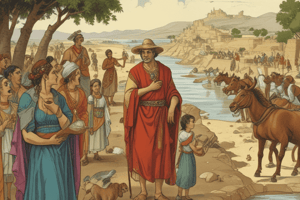Podcast
Questions and Answers
Which ancient civilization settled at the north of the Iberian Peninsula?
Which ancient civilization settled at the north of the Iberian Peninsula?
- Celts (correct)
- Tartessians
- Phoenicians
- Greeks
What type of villages did the Celts and Celtiberians live in?
What type of villages did the Celts and Celtiberians live in?
- Walled cities
- Coastal towns
- Fortified villages (correct)
- Mountain retreats
Which ancient civilization was known for being very good at metallurgy?
Which ancient civilization was known for being very good at metallurgy?
- Phoenicians
- Greeks
- Iberians
- Celts (correct)
Who were attracted to the Tartessian civilization due to their wealth in metals?
Who were attracted to the Tartessian civilization due to their wealth in metals?
Which ancient civilization developed writing and currency?
Which ancient civilization developed writing and currency?
In which century did the Phoenicians come into contact with the Tartessian civilization?
In which century did the Phoenicians come into contact with the Tartessian civilization?
Who were the best sailors of their time in the Mediterranean during the VI century B.C.?
Who were the best sailors of their time in the Mediterranean during the VI century B.C.?
Which ancient civilization invented Philosophy?
Which ancient civilization invented Philosophy?
What type of government did Athens have during ancient times?
What type of government did Athens have during ancient times?
Which Carthaginian general led the forces against Rome in the Second Punic War?
Which Carthaginian general led the forces against Rome in the Second Punic War?
Which Phoenician colony eventually took control of its colonies after the Phoenicians disappeared?
Which Phoenician colony eventually took control of its colonies after the Phoenicians disappeared?
Where did Rome send an army that marked the beginning of the Second Punic War?
Where did Rome send an army that marked the beginning of the Second Punic War?
Flashcards are hidden until you start studying
Study Notes
Early Inhabitants of Iberian Peninsula
- Iberians were the first inhabitants of the Iberian Peninsula, living in tribes and thriving during the Metal Ages.
- They were farmers, traders, and warriors who developed writing and currency.
Celts in Iberian Peninsula
- Celts arrived from North Europe and settled in the north of the peninsula.
- They lived in tribes, raised cattle, and were skilled in metallurgy, but lacked a written language and a monetary system.
- They were fierce warriors who lived in fortified villages called "castros."
Celtiberians
- Celts and Iberians mixed in the center of the peninsula, creating a new culture, the Celtiberians.
- Celtiberians lived in tribes, farmed, and were fierce warriors and riders.
- They were skilled in metallurgy and lived in fortified villages.
Phoenicians and Tartessian
- Phoenicians, sailors and traders from Tyre and Sidon, arrived in the 11th century B.C.
- They founded cities like Gadir (Cadiz) and Malaca (Malaga) and traded with the Tartessian kingdom.
- Tartessian was rich in metals and trade, attracting Phoenician attention.
Greeks in Iberian Peninsula
- Greeks established colonies at the western end of the peninsula, such as Emporion and Roses.
- Greek colonies had autonomous city-states (Polis), a rich culture, and invented philosophy.
- Each Polis had a government; Athens had democracy, but only for free men.
Carthaginians in Iberian Peninsula
- Carthage, an old Phoenician colony, developed due to its strategic Mediterranean position.
- Carthaginians took control of Phoenician cities, created new ones, and hired Iberians and Celts as warriors.
- Hannibal, a Carthaginian general, started the Second Punic War, which led to Carthage's defeat and loss of territory in the peninsula.
Studying That Suits You
Use AI to generate personalized quizzes and flashcards to suit your learning preferences.




